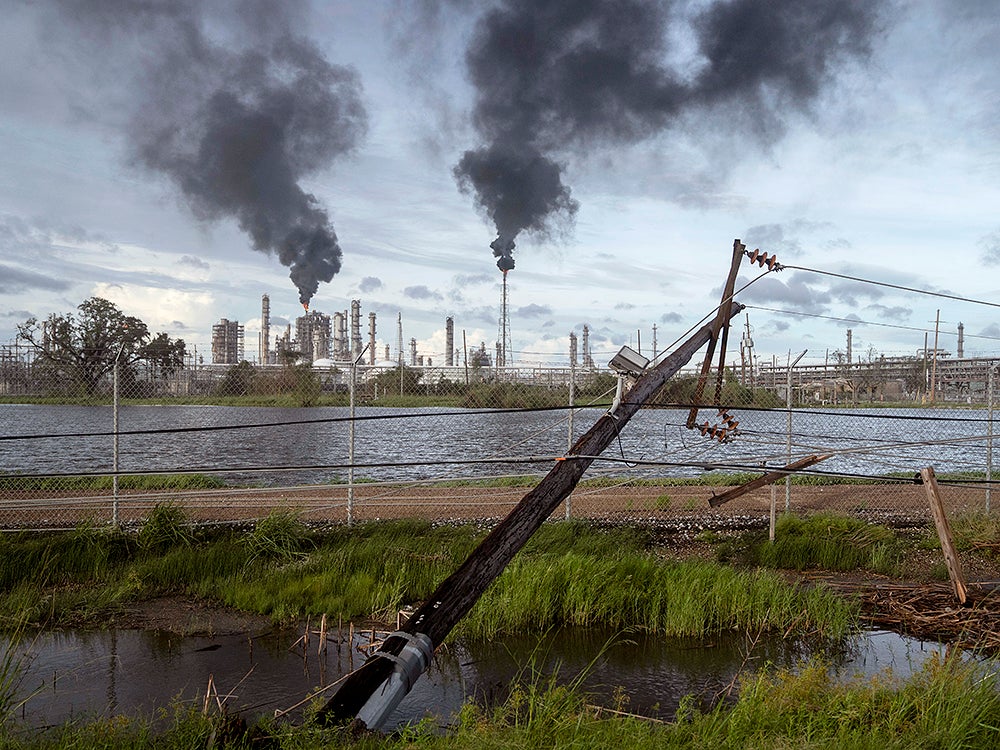How You Can Help People Hit By Hurricane Ida
Communities urgently need assistance now — and in the long run, we must stop the burning and extraction of fossil fuels.

This page was published 4 years ago. Find the latest on Earthjustice’s work.
Hurricane Ida grew ferocious fast, pumped up by decades of fossil fuel pollution.
Climate change driven by the burning of fossil fuels is making hurricanes more powerful. What’s more, fossil fuel facilities — which can catch fire and leak dangerous chemicals when struck by natural disasters — are concentrated in the Gulf Coast region where the storm made landfall. Due to discriminatory patterns of government regulation, these facilities tend to be situated in — and do the most harm to — communities of color.
Today, communities hit by the storm urgently need recovery assistance:
- Help displaced Gulf Coast residents get housing: FEMA still has not activated its individual assistance (hotel voucher) program outside of Louisiana. The Red Cross has not filled this critical gap either. Contact FEMA Region 4 (770-220-5200, fema-r4-external-affairs@fema.dhs.gov) and Region 5 (312-408-5500) and Red Cross National (1-800-733-2767, or redcross.org/alabamamississippi) to urge them to provide shelter for those who need it.
- Contribute to a disaster relief fund: Donations to the Gulf Coast Center for Law and Policy go directly to communities dealing with climate disasters.
- Provide basic supplies for people in need: Cajun Navy is collecting donations of cleaning supplies, toiletries, water, canned food, and other essentials.
Earthjustice is using the power of the law to end the burning and extraction of fossil fuels and stop the oil and gas industry from making the Gulf Coast a sacrifice zone:
- We’re fighting to stop a petrochemical buildout in the Gulf Coast, which would dump pollution in already-contaminated communities and lock in more fossil fuel consumption for decades to come.
- We just sued the Biden administration over its decision to plow ahead in offering 80 million acres of the Gulf of Mexico for oil and gas leasing, even in the wake of a catastrophic storm.
Learn about other organizations doing critical environmental work in the Gulf:
- Rise St. James is a community group fighting to protect residents of St. James Parish, Louisiana, from toxic petrochemical pollution.
- Louisiana Bucket Brigade helps communities near oil refineries, chemical plants, and other facilities challenge the petrochemical industry’s expansion.
- Healthy Gulf is working to protect the Gulf Coast’s natural resources.
- Deep South Center for Environmental Justice pushes for a better future for children and families harmed by pollution and threatened by climate change.
- Alliance for Affordable Energy advocates for equitable, affordable, and environmentally sound energy systems across Louisiana.
The Gulf Regional Office works with communities and other partners fighting for a healthy and just future in the Gulf. We work to cut pollution, end fossil fuel expansion, protect our region’s precious places and wildlife, transition to clean energy, and drive climate solutions that work for everyone.